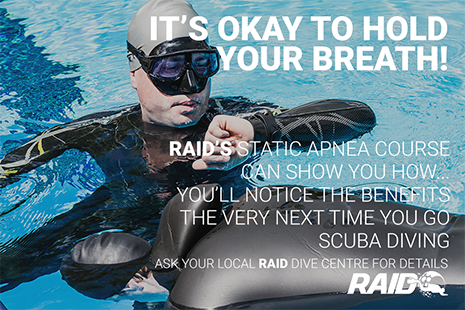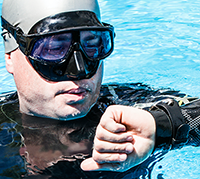WHY BREATH-HOLDING IS IMPORTANT TO SCUBA DIVERS

This month, RAID is shining a spotlight on the benefits of static apnea training for scuba divers. Odd that something divers are told NOT to do — hold their breath — can offer such a long list of rewards.
Static apnea is listed as a freediving discipline where a person holds their breath underwater for as long as possible without swimming or moving around. As a stand-alone skill, it is a competitive category for freediving. However, static apnea training can offer several benefits for scuba divers too, enhancing their overall diving experience and safety.
And the added bonus is that Static Apnea training is available from most RAID instructors because we feel it is such an important and fundamental skill that sits at the very core of being comfortable and ‘at one’ with the water.
Here are some key advantages:
- Improved Breath-Hold Capacity: Training in static apnea helps divers increase their ability to hold their breath longer. This can be crucial in situations where a diver needs to remain underwater without surfacing for air.
- Better CO2 Tolerance: Static apnea training improves the body’s tolerance to carbon dioxide (CO2), which can help divers manage stress and discomfort during prolonged dives or situations where breathing may be restricted.
- Enhanced Buoyancy Control: By practicing breath-holding techniques, divers become more attuned to their body’s buoyancy, allowing for more precise control while underwater and potentially reducing air consumption.
- Mental Focus and Relaxation: Static apnea emphasizes relaxation and mental focus, which are essential for effective diving. Developing these skills can help divers manage anxiety and panic during dives.
- Increased Safety: With improved breath-hold times and CO2 tolerance, divers may find themselves in safer positions in case of unforeseen circumstances, such as equipment failure or the need to troubleshoot underwater.
- Physical Conditioning: It can enhance cardiovascular fitness and lung capacity, leading to improved overall physical conditioning beneficial for diving activities.
- Better Understanding of Physiology: Divers gain knowledge about how their bodies react to pressure changes, breath-holding, and hypoxia (low oxygen levels), leading to more informed and safer diving practices.
- Enhanced Mental Resilience: Regular practice of static apnea can build mental toughness, preparing divers for stressful and potentially dangerous situations encountered underwater.
So, incorporating static apnea training into a diver’s routine can provide substantial advantages, not only in their diving skills but also in ensuring a safer and more enjoyable experience.


